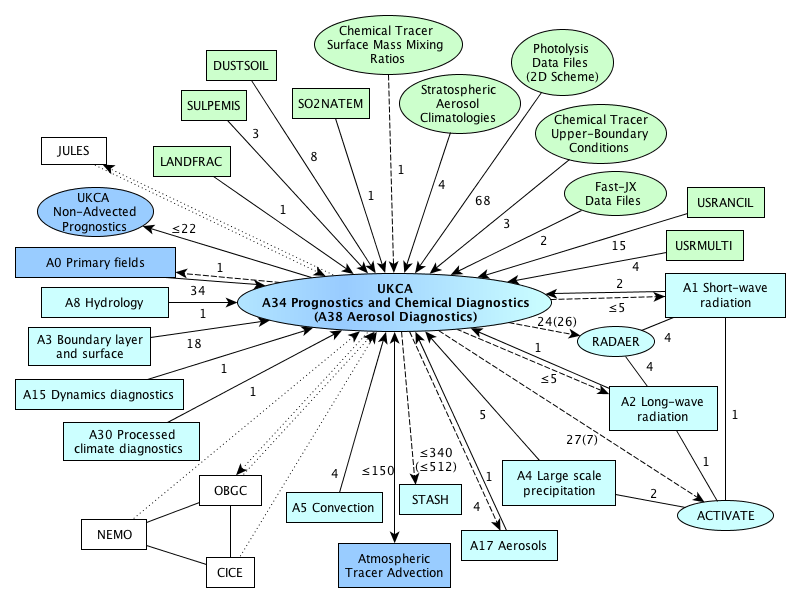
Research Professor
I am a Research Professor (previously a Director of Research) in the Department. I am a member of the National Centre for Atmospheric Science, where I am also the Training Programme Lead, working at the Centre for Atmospheric Science here in the Department.
I work with the United Kingdom Chemistry and Aerosols community chemistry-aerosol-climate model. This is based on the Met Office Unified Model, and is a collaboration between the Universities of Cambridge, Leeds, Oxford, and the Met Office.
I am a Fellow of the Software Sustainability Institute and have written blogs on how to use virtual machines for training and the benefits of in-person training, as well as co-authoring a blog on how to write good research software. I was also interviewed by the Naked Scientists podcast, discussing climate modelling and what can go wrong and how to fix it.
I am a member of NCAS Computational Modelling Services and provide model support for UKCA on both ARCHER2 and Monsoon2. If you require support please raise a ticket with the CMS Helpdesk, or if you would like to know more about UKCA in general, please email me, or browse through the UKCA wiki. This provides information about the model, the standard jobs that are available, publications using the model, and also a tutorial covering how to get started with the model and add in new chemistry, emissions, species etc.
Research Interests
I am interested in chemistry-climate interactions and Earth-system modelling. I joined the group to work on the QUEST Earth-System Model that was based around the UKCA chemistry-aerosol-climate model. This is part of the UM and forms the chemistry and aerosol components of UKESM, the UK joint NERC-Met Office Earth-system model.
A lot of my past work has been on the development of a coupled atmosphere-ocean-chemistry model, using the MetUM atmosphere and NEMO/CICE, as covered in an NCAS research highlight. I am also been involved with the CCMI project. The video below follows the evolution of the Total Ozone Column from 1960-2100 from one of our REF-C2 ensemble members that was submitted to CCMI-1.
As part of my work on model development I am interested in the coupling of UKCA to the Unified Model, as well as other sub-models. The diagram below shows the couplings from the UM to the UKCA model.

Teaching
I have developed a series of UKCA Tutorials. These tutorials are designed to be run in your own time, although I also run a face-to-face tutorial which covers the contents. You can use the Met Office Virtual Machine to go through the materials on a PC or the JASMIN unmanaged cloud or on AWS. I have discussed using this approach for online training at the JASMIN User Seminar Series and the SemtembRSE online conference. I am also a Carpentries Instructor.
Since 2015 UKCA training has been held in the Department, with the 2018 lectures recorded and available online. Details of future courses can be found on the NCAS website.
The image belows shows part of the emissions task - the regridding of emissions data from 0.5x0.5 degress to UM N96 resolution.

Current PhD Projects
I am currently advertising PhD projects within the NERC CREATES Doctoral Landscape Award in the University. In particular, I have one project with CASE support from the UK Met Office on lightning within Earth System Models. Please contact me if you are interested in discussing potential projects further.
Links
- ORCiD: 0000-0003-3750-3544
- Google Scholar page
- GitHub profile
- UKCA website
- National Centre for Atmospheric Science
- Cambridge Centre for Atmospheric Science
- NCAS Science Highlight: The key role of ozone in global warming experiments
- NCAS Press Release: Scientists develop new method to assess ozone layer recovery
- University of Cambridge Press Release: Scientists develop new method to assess ozone layer recovery
- Naked Scientist Podcast - Computer Models: Welcome to the catwalk
- SSI Blog: Using virtual machines for training
- SSI Blog: Aim For Understandability If You Want To Write Good Research Software
- JASMIN User Seminar Series: Using the JASMIN Unmanaged Cloud for UKCA Training
- SeptembRSE conference: Changing from in-person to online training during the Covid-19 pandemic
- ARCHER2 eCSE project: Reducing UM-UKCA data output using flight-track simulation
- SSI Blog: The benefits of in-person training
- Dr Luke Abraham promoted to Director of Research
- Atmospheric science awarded grant to advance climate models
- VISION: The cutting-edge tool transforming atmospheric science and climate research
Publications
- ‹ previous
- Page 2

